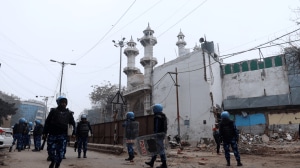Govt plans diagnostics for healthcare
Moving to standardise healthcare systems across the country, the Health Ministry has begun working on a scheme which will make it compulsory...

Moving to standardise healthcare systems across the country, the Health Ministry has begun working on a scheme which will make it compulsory for a hospital, nursing home, clinic, diagnostic centre or a private practitioner to have accreditation to function.
Once the scheme is approved, not only will these institutions require registration but they will also be graded in categories depending on the facilities they offer.
Speaking to The Indian Express, Health Minister Anbumani Ramadoss said his Ministry was already working on a legislation for Parliament to make this compulsory for all healthcare institutions.
8216;8216;Healthcare in India needs to move from arbitrary functioning to a more regular system where categorisation, standardisation and accreditation will be an intrinsic part of the system before a hospital or clinic is allowed to function,8217;8217; Ramadoss said. The institutions would be graded into categories A, B, C or D, depending on the facilities they offer. Category A at the top will be reserved for the state-of-art hospitals with latest equipment for advanced surgeries, scans. Categories would also depend on the number of beds in a hospital/nursing home, doctors/nurses per patient and other such criteria. Healthcare institutions could revise their grades as they upgrade and add more facilities. 8216;8216;A legislation called the Clinical Establishments Regulation Act of 1996 has been pending before Parliament but we may come up with a fresh legislation on the issue in close consultation with all parties concerned, including doctors and corporates, before we finalise the draft,8217;8217; Ramadoss said. According to him, the Ministry would work out details after discussions with parties like the Indian Medical Association IMA, corporates setting up hospitals and state governments. The states will then need to implement the law. 8216;8216;Currently, even a quack can build a hospital in a small town. All he needs is a building permission.
Now the focus will change, making it compulsory to have certificates in health specialisation. This will prevent incidents of people dying during surgeries by quacks,8217;8217; he said. The IMA, meanwhile, says the recommendations for accreditation of healthcare system was a result of a workshop jointly conducted by the Government, IMA, Medical Council of India and WHO. 8216;8216;In the workshop, it was recommended to have ratings for hospitals and get all medical professionals accredited,8217;8217; said Dr Vinay Agarwal, IMA general secretary.
| nbsp; |
Existing loopholes
|
||||
| nbsp; |
8226; Registration of nursing homes, hospitals is a state subject. Normally no permission needed to start a clinic |
nbsp; | |||
8216;8216;If the Government is formally planning this, the IMA is in total agreement. Ratings can help as nobody will be able to attach a superspeciality tag to a nursing home or hospital without satisfying pre-requisites. So we won8217;t have heartcare hospitals or cancer hospitals in every nook and corner8217;8217; Agarwal said.
The National Commission on Macroeconomics is already carrying out a survey in eight districts across the country to study the existing healthcare system and the cross checks in it for safe healthcare. The survey will map every private practitioner in the district to see what are the checks to ensure patient safety. The survey report is likely to be submitted to the Minister next month. While the legislation is still in its preliminary stages, what it could mean is a law to ensure universal system of gradation across states, regulatory infrastructure for gradation at regular intervals and monitoring implementation.
Ramadoss has more plans: 8216;8216;Once this system is in place, we could target health tourism as big business. Trained doctors and efficient nursing would be attractive for patients from the Far East and Europe. A heart patient in the UK has to wait for three years if he needs surgery and it costs him an equivalent of Rs 14 lakh. In India, this will cost 40 per cent less even if the entire family of the patient comes here for healthcare.8217;8217;
- 01
- 02
- 03
- 04
- 05































